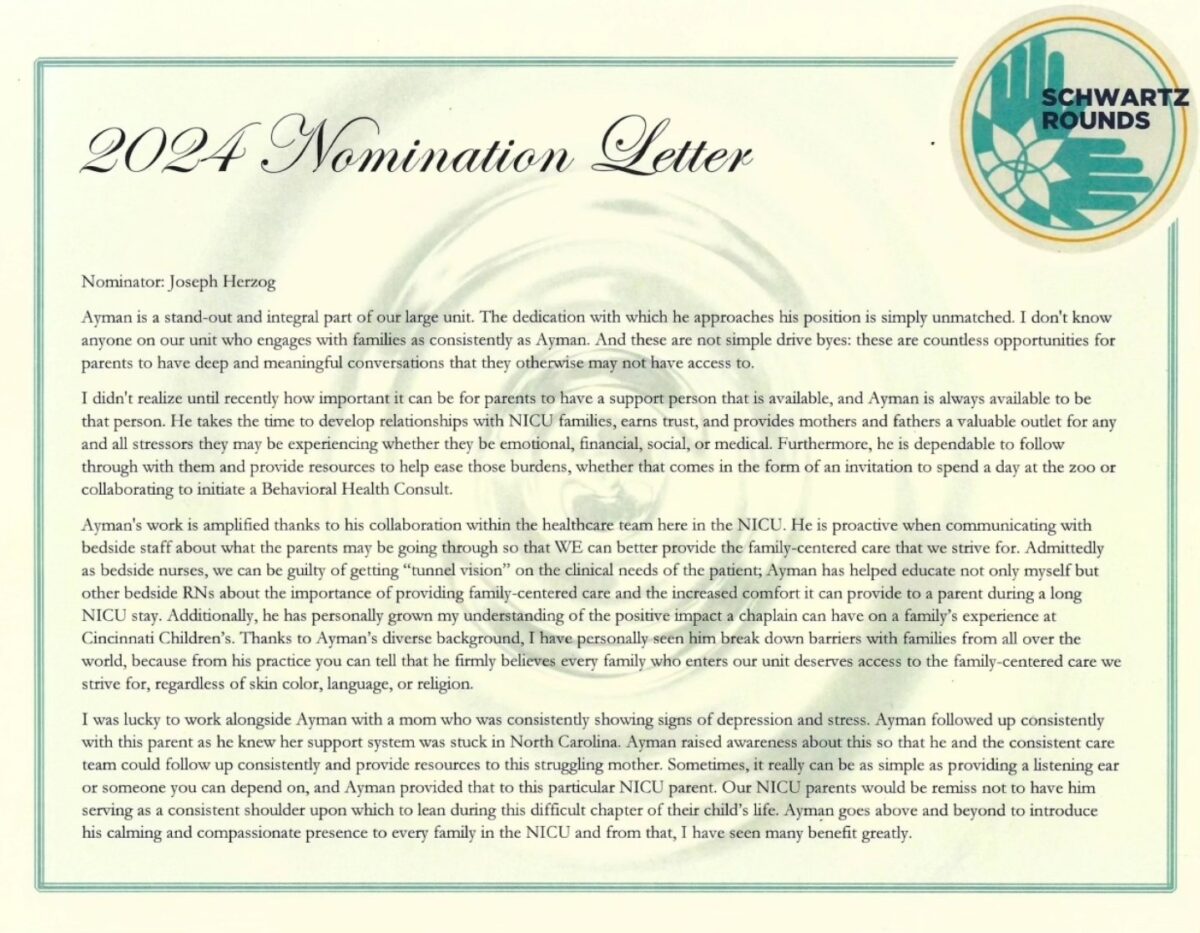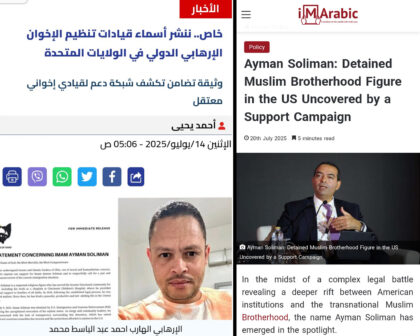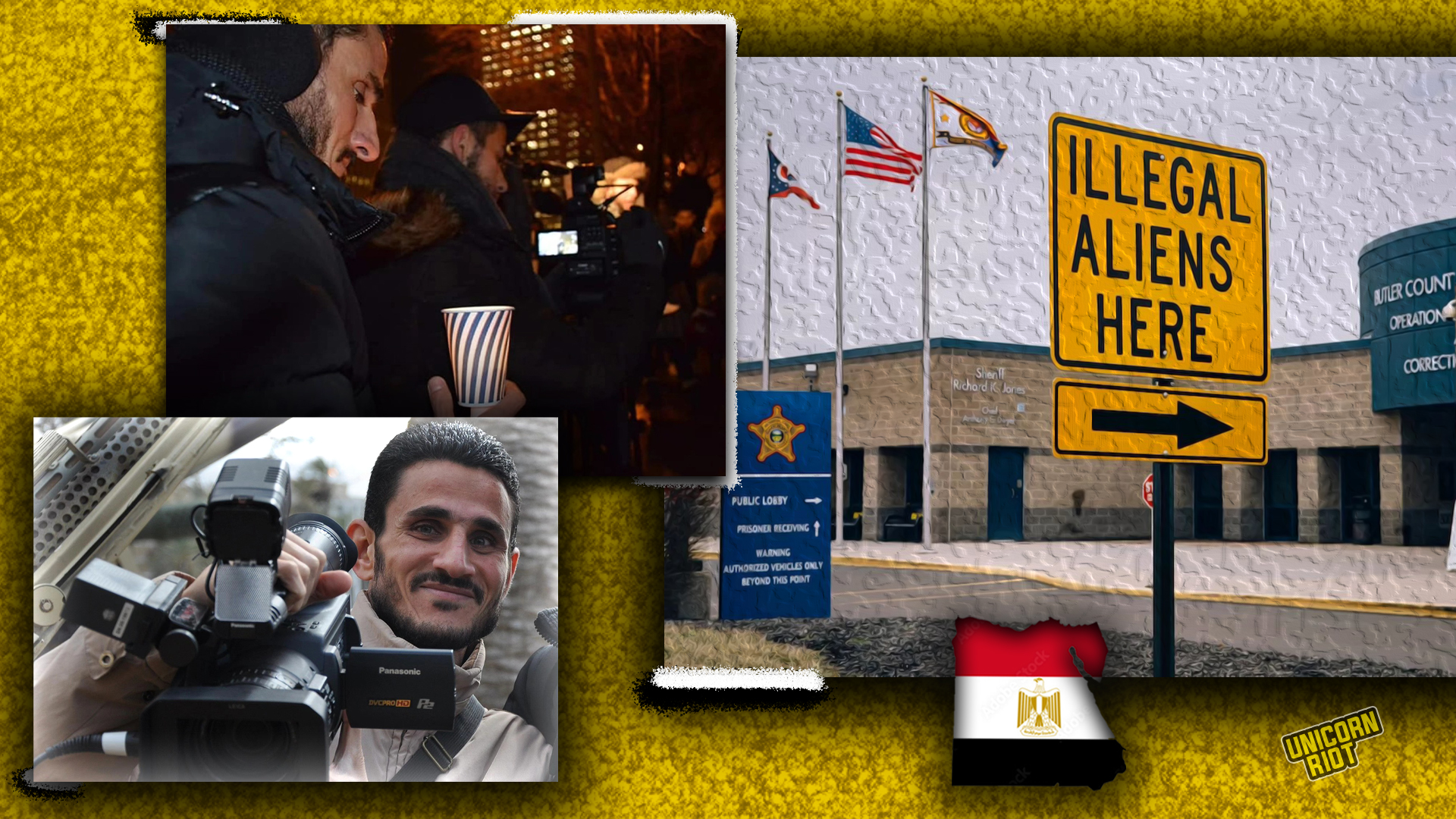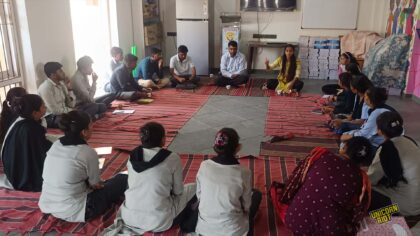A Chaplain Trapped Between Trump’s Deportation System and Egypt’s Autocratic Regime
Cincinnati, OH – After spending two months in ICE custody at Butler County Jail, Ayman Soliman was released last Friday, September 19. The former interfaith chaplain at Cincinnati Children’s Hospital found himself trapped between the U.S.’s quota-driven deportation system and Egypt’s autocratic regime known for killing and silencing critics. Now out of jail, he’s revealing the glaring errors in President Donald Trump’s deportation campaigns.
“We have been told that they were detaining and deporting the worst of the worst,” Soliman said after his release at the Clifton Mosque. “And I can tell you firsthand that I saw the best of the best unjustly detained and unjustly deported.”
Soliman’s release was a relief for friends and activists, but his attorney, Robert Ratliff, warned that the government’s legal schemes that led to Soliman’s arrest — from revoking his asylum without review to stretching anti-terrorism laws so broadly that the Egyptian equivalent of a Rotary Club can be interpreted as material support for terrorism — could affect countless immigrants.

“These are tactics that millions of immigrants are going to face in the very near future,” Ratliff said. “Without any review, [the Department of Homeland Security (DHS)] was able to revoke asylum, was able to determine that their own evidence was sufficient, and then used those allegations to detain this man for 70-plus days.”
Weeks earlier, the Board of Immigration Appeal — a federal immigration board under the DOJ — said that those who entered the U.S. without proper documentation are not eligible for bond. Ratliff warned that this will be the norm going forward in a nod to Mahmoud Khalil’s case.
“DHS can now decide on their own through [US Citizenship and Immigration Services (USCIS)] that we want to terminate your asylum, or we want to revoke your green card, or we want to even revoke your citizenship,” Ratliff said, warning that these decisions leave migrants trapped in limbo “Because these actions are unreviewable by any court until the case moves through the immigration process, individuals can be detained for weeks, months, or even indefinitely.”
UR: Secret Homeland Security ICE/HSI Manual for Stripping US Citizenship (2018)
Ratliff added that the State Department compounded these risks when they designated Latin American crime organizations as foreign terrorist organizations. “That means if you paid extortion, or you paid for a coyote, or you’ve had to pay a war tax to your local cartel, you’ve, in the eyes of the government, possibly provided material support to a terrorist group, and you may be facing detention and deportation.”
Ratliff argued that a legal victory is meaningless because DHS can deport someone before a ruling takes effect. For Soliman that threat was too real and potentially fatal. Flanked by clergy members and state lawmakers who had come to support him, the 51-year-old Muslim chaplain knew this routine check-in could be his last day of freedom in America.
“Going back to Egypt for me is a death sentence,” Soliman said in a video posted to Instagram. “I didn’t come to America seeking a better life — I came to escape death.”
On July 9, Soliman was in federal custody, swept into a detention system that now holds nearly 60,000 people. His case has become the latest example of how post-9/11 counterterrorism laws are being weaponized to accelerate deportations under the Trump administration’s renewed immigration crackdown.
Arrested at 3 p.m., he spent 10 hours in a holding pod before he was transferred to a cell. He recalled the door opening at 5 a.m. and joining a long breakfast line when another inmate told him, “Oh, you have a lot of people advocating for you.”
Soliman’s journey began when he covered protests during the Arab Spring. Over the next decade, his activism and journalism work made him a target of Egyptian security forces who repeatedly imprisoned and tortured him, according to his asylum application.
“In general if a journalist exposes the regime, or talks about freedom of speech,”Ahmed Elkady, an Egyptian and one of Soliman’s closest friends, said about the El-Sisi regime’s efforts to silence critics. “Egypt has been recognized by human watch organizations as a place not friendly with journalists who are seeking the truth.”
As the Arab Spring swept across the Middle East, Soliman documented pivotal moments of Egypt’s democratic uprising. He covered the 2011 constitutional referendum, the Maspero demonstrations where military forces killed dozens of Coptic Christian protesters, and the 2013 presidential elections for Spanish television networks La 1 de TVE and Antena 3. He also worked as a field producer on the documentary Benghazi: Beyond the Front Line, which spotlighted grassroots voices in post-revolution Libya.

Egypt’s brief democratic experiment collapsed in 2013 when military leader Abdel Fattah el-Sisi seized power in a coup. The new regime launched a brutal crackdown on journalists, activists, and anyone associated with the Muslim Brotherhood, the Islamist political movement that had briefly held power.
The danger became acute on July 3, 2013 — the day of the military coup that toppled Egypt’s elected government. Soliman was covering the unfolding events when he was captured by security forces, according to Elkady.
“Both,” Elkady said when asked whether Soliman’s current deportation threat stems from his journalism or alleged Muslim Brotherhood ties. “He was captured on July 3rd, the day of the military coup, during covering the events.”
Like many Egyptian activists, even while in the U.S., Soliman rarely spoke openly about his opposition to authoritarian rule, even among friends. “As Egyptians, we do not talk much about it because we know it,” Elkady explained. “Another factor is we have families in Egypt.”
Facing imminent arrest, Soliman fled to the United States in 2014 on a visitor visa and applied for asylum four years later. In his application, he fully disclosed his volunteer work with al-Jameya al-Shareya, an Egyptian charity established in 1912 that runs hospitals and sponsors orphans nationwide.

“Ayman himself sponsored two children, and he was so passionate about the work for orphans that he became a volunteer and started, in addition to sponsoring two orphans, himself, began sponsoring two in any way that he could,” Tala Ali, a Palestinian-Jordanian interfaith academic chaplain and longtime friend to Soliman, told Unicorn Riot.
Soliman was granted asylum in 2018 under the first Trump administration and wanted to rebuild his life as a chaplain at the Oregon Department of Corrections. Unfortunately for Soliman, he fell into a trap of a database that discriminates against Muslims and immigrants.
A background check revealed his name was flagged in the FBI’s Terrorist Screening Database, a massive watchlist that has grown from roughly 120,000 names in 2003 to around 2 million today.
New Federal Task Forces Under 287(g) Could Form ‘ICE Army’ From National Guard, State, Local & College Police [May 29, 2025]
While not on the No Fly List, the unresolved flag with mismatched fingerprints prevented Soliman from working in the corrections system and cast a shadow over his asylum status. Studies show that approximately 40 percent of people on terror watchlists are later identified as false positives, with Muslims and people of Middle Eastern and South Asian descent disproportionately affected.
Seeking to clear his name, Soliman filed a lawsuit against the FBI and Terrorism Screening Center with help from the Muslim Legal Fund of America. The FBI neither confirmed nor denied his presence on the watchlist, but leaked documents from 2023 revealed Soliman’s name was indeed included.
That lawsuit stalled for years. Afterwards Soliman began working as a chaplain at Cincinnati Children’s Hospital earning praise from patients.


“Ayman is someone they have showered with awards and accolades for his care of the families and his relationship,” Ali said. “That’s evident also by the so many of the families coming forward and speaking to media about knowing him and what he did for them, as well as his colleagues,”
“He was with us every step of the way,” Heather Barrow told MSNBC. Her daughter was born six months premature, and Soliman provided crucial spiritual support during the family’s ordeal. “Ayman was instrumental in providing comfort.”
“We don’t know how he finds the time to sit with all of the families and not just sit with them. I’ve heard from numerous families that, in addition to holding space for them, he would check in on them every day, and also especially the parents and the NICU, for example, with children and with babies who were fighting for their lives,” Ali said.
In December 2024, DHS under Joe Biden moved to revoke his asylum status. The notice cited “inconsistencies” in his persecution claims and raised concerns about his charity work potentially constituting “material support” to terrorist organizations.
When Trump returned to office in January 2025, immigration officials escalated the case dramatically. They formally designated the Muslim Brotherhood as a “Tier III” terrorist organization and argued that Soliman’s charity work constituted material support.
Material support statutes, enacted after 9/11, criminalize almost any aid to designated terrorist groups — extending far beyond weapons or money to include legal advice, training, and even humanitarian assistance. Civil liberties advocates have long warned that these broadly written laws give prosecutors a “sledgehammer” that can be abused, particularly against Muslim Americans.
Earlier this year, Rumeysa Ozturk had her student visa revoked after penning an op-ed criticizing Tufts University’s ties to Israel. DHS claimed that her op-ed and campus activism amounted to “support” of Hamas. An immigration judge ordered the deportation of Columbia University graduate Mahmoud Khalil for allegedly failing to report his work with a UN Palestinian relief agency, as his legal team plans to appeal, arguing a separate ruling bars his removal.
Robert Ratliff, Soliman’s attorney, told reporters that Soliman checked “yes” on his asylum application in 2018 and disclosed that he’d fundraised for an Al-Jameya al-Shareya.
Kate Brady, the lead immigration litigator at the Muslim Legal Fund of America, sees these cases as part of the Trump Administration’s strategy to leverage administrative processes to fulfill their campaign promise of mass deportation.
“The current Trump administration’s draconian immigration strategy leans into the punitive immigration enforcement policies that ran into roadblocks the first time around,” said Brady. “Essentially, we are seeing the execution of Project 2025 here.”
“I believe immigration policy advisor Stephen Miller’s focus on trampling on the due process rights of noncitizens and jettisoning any semblance of the rule of law for immigrants has done little to increase the security of the United States,” Brady said.
The designation of al-Jameya al-Shareya (widely known for its shorthand GS in English reports) as a Tier III terrorist-linked organization raises serious questions about how asylum officers make such determinations given there were no objections in the first Trump term. The State Department has not designated GS as a terrorist organization.
In 2014 an Egyptian administrative court overturned the ban and asset freeze imposed on GS, ruling that the charity had no formal ties to the Muslim Brotherhood — even though the freeze and ban were imposed by the government that took power after President Mohamed Morsi was ousted in 2013.
In court filings, DHS lawyers cited academic work by Steven Brooke and Marie Vannetzel to argue there is a connection between GS and the Muslim Brotherhood. Both scholars filed statements contesting the government’s interpretation of their work, saying portions were taken out of context.
“Clearly, transporting voters to the polls is not ‘terrorism’ — that strips the term of any real meaning,” Brooke told Unicorn Riot. “It is also a considerable stretch to interpret this act as GS being ‘part’ of the Muslim Brotherhood. I would characterize it as an idiosyncratic episode of local contact between two very large social movements.”
Brooke emphasized that any cooperation between GS and the Brotherhood was always “local and situational, often tied to the idiosyncrasies of particular personalities or places.” He rejected any notion of organizational-level collaboration, noting that under the Mubarak regime, GS actually partnered with the Egyptian government on social and religious tasks like training imams and administering mosques.
Brooke said he had “never heard of a ‘Tier III’ organization” and warned that complex terrorism designations “should not be based on idiosyncratic decisions by single individuals.”
Under normal procedures, only the Secretary of State has authority to designate Foreign Terrorist Organizations through a transparent process involving multiple agencies and expert consultation. But material support laws allow immigration officers to make ad-hoc determinations about “undesignated” groups based on much lower standards of evidence.
“These are serious questions, and ideally our government would make its own judgments, based on its own experts, analysis of evidence, and in light of our own national interests,” Brooke said in an interview, “rather than simply taking the word of an authoritarian regime.”
Brooke also noted that DHS’s terrorism allegations mirror those made by Egypt’s military government, which designated the Muslim Brotherhood as a terrorist organization in December 2013 after a suicide bombing claimed by the unrelated group Ansar Bait al-Maqdis. He characterized Egypt’s designation as “essentially pretextual” and designed to “further undermine and delegitimize a primary opponent of the military government.”
DHS lawyers made further missteps in an alarming footnote. “Based on the three outstanding warrants in Iraq for murder and terrorism related activities,” the footnote read in regards to Soliman that he was, “ineligible for asylum and withholding of removal because there are serious reasons for believing that he committed serious nonpolitical crimes prior to his arrival to the United States.”
“It’s a monumental screw-up,” said Ali. “Either they have the wrong Ayman Soliman, or they copy-pasted claims from another file and forgot to delete the footnote.”
As if on cue, Egyptian media outlets Al Bawaba News and Al Bawaba Arabic, both aligned with the Sisi regime, published articles painting Soliman as the leader of a Muslim Brotherhood cell in America — in some cases using a photograph of an entirely different person.

Elkady noticed other Egyptian outlets were copying from one another, framing Soliman as a member of the Muslim Brotherhood. Ali said the coverage was designed not only to justify Soliman’s disappearance if deported, but to intimidate U.S.-based supporters.
“They published my name along with all of the other clergy and imams, specifically Muslim clergy and imams, who drafted a public statement representing all of the local masses here in support of Ayman,” Ali said. “And they listed us as the T word [terrorist], and as there was a line from brotherhood that were secretly embedded here and just trying to already lay a foundation for him to be disappeared, if worst case scenario were to happen.”
Supporters sent Soliman over 700 letters — a gesture that was his emotional anchor. “Last time I talked to him, he said, at that point he had received 50 to 60 letters. And he said, ‘these are what are keeping me alive and sane at this point, and I really appreciate it. And I sit with the letters all the time,’” Ali said, just days after Soliman’s arrest.
“He is someone who just completely gave him his whole self to human beings, people and community in general, whether it was in his capacity as an imam, a chaplain, or as a journalist, he always centered people and their lives and their stories and their well being, and did every thing he could with every fiber in his being to support people and community,” Ali said.
Cover image by Niko Georgiades for Unicorn Riot – images sourced from Cincinnati CityBeat and Ayman Soliman via Clint Combs.
Follow us on X (aka Twitter), Facebook, YouTube, Vimeo, Instagram, Mastodon, Threads, BlueSky and Patreon.
Please consider a tax-deductible donation to help sustain our horizontally-organized, non-profit media organization:



